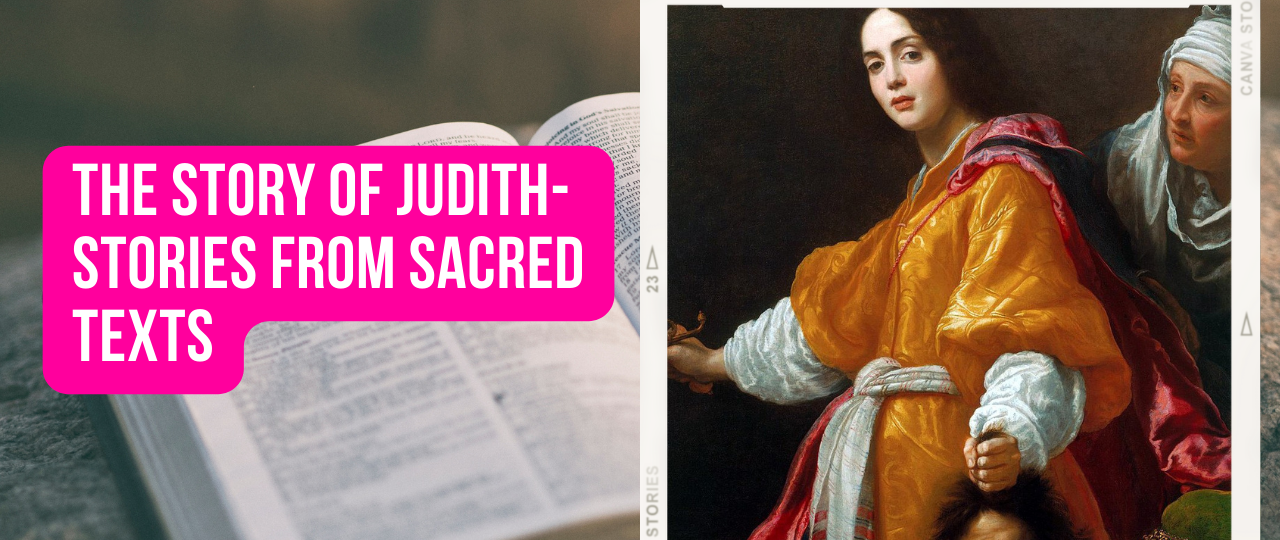The story of Judith who saved the Jews of Bethulia from annihilation during the reign of Nebuchadnezzar (ruled 605-562 BCE) can be found in the Apocrypha from the Hebrew Bible. Judith was a Jewish widow who lived in Bethulia, when Nebuchadnezzar's famous general Holofernes brought his army to their village, directed to conquer the area for his Babylonian king.
However, Holofernes discovered that the village flourished with one spring of water. Delaying his invasion, he decided to have his army plug up the spring with stones and stand guard. After three days, the Bethulians were thirsty and desperate. Judith stepped forward to ask the elders to intervene. They told her to trust in God. Instead, she returned home, took off her dark widow's garb and put on her sexiest outfit, determined to take matters into her own hands.
Judith set out for Holofernes' encampment with her maidservant, taking wine and cheese in a sackcloth as a gift for the general. At the entrance to the encampment, Judith convinced the guardsmen she was ready to share strategic information with the general. Since she was Jewish, no one doubted that she needed to carry her own kosher food to sustain her for the journey. Once inside the general's tent, she fed Holofernes plenty of salty cheese which required that the general drink plenty of wine to quench his thirst, as in Lucas Cranach the Elder's Judith Dining with Holofernes (1531).
The wine made him drunk. In a stupor, he lay down on his bed expecting Judith to follow. Seizing her chance, Judith took Holofernes sword and with her maidservant's help, cut off his head and put it into her sack. The two women then walked past the guards easily, as they assumed that Holofernes was still in his tent much satisfied, as in Cristoforo Allori's Judith with the Head of Holofernes (1613). The next day, Holofernes' army discovered their murdered leader and decided to retreat, leaving the Bethulians free to unplug their spring and return to normalcy. Judith was celebrated throughout the village and lived a long and prosperous life thereafter.
Today we believe that Judith was an ancestor of the Maccabees who fought Antiochus IV Epiphanes (ruled 175-164 BC) in order to regain control of the Temple in Jerusalem during the Hellenistic period. Hanukah, the festival of light, celebrates the Maccabee victory over Antiochus, the rededication of the Temple and the miracle of the lamp oil which should have lasted only one day, but lasted eight. On the fifth day of Hanukah, Jews eat cheese and other dairy products to remember Judith's great deed which parallels the Maccabees' in 167 BCE.
Note:
The Jewish Encyclopedia identifies the real name of "Bethulia" as Shechem and argues that the name was changed because of the feud between the Jews and Samaritans. If this is the case, it would explain why other names seem anachronistic as well.
Why was the Book of Judith removed from the Bible?
While the author was likely Jewish, there is no evidence aside from its inclusion in the Septuagint that the Book of Judith was ever considered authoritative or a candidate for canonicity by any Jewish group. The Masoretic Text of the Hebrew Bible does not contain it; it is not found among the Dead Sea Scrolls or any early Rabbinic literature. Speculated reasons for its exclusion include the possible lateness of its composition, possible Greek origin, apparent support of the Hasmonean dynasty (to which the early rabbinate was opposed), and perhaps the brash and seductive character of Judith herself.
After disappearing from circulation among Jews for over a millennium, however, references to the Book of Judith and the figure of Judith herself resurfaced in the religious literature of crypto-Jews who escaped Christian persecution after the capitulation of the Caliphate of Córdoba. The renewed interest took the form of "tales of the heroine, liturgical poems, commentaries on the Talmud, and passages in Jewish legal codes." Although the text does not mention Hanukkah, it became customary for a Hebrew midrashic variant of the Judith story to be read on the Shabbat of Hanukkah as the story of Hanukkah takes place during the time of the Hasmonean dynasty.
That midrash, whose heroine is portrayed as gorging the antagonist on cheese and wine before cutting off his head, may have formed the basis of the minor Jewish tradition to eat dairy products during Hanukkah. In that respect, medieval Jewry appears to have viewed Judith as the Hasmonean counterpart to Queen Esther, the heroine of the holiday of Purim. The textual reliability of the Book of Judith was also taken for granted, to the extent that biblical commentator Nachmanides (Ramban) quoted several passages from a Peshitta (Syriac version) of Judith in support of his rendering of Deuteronomy 21:14.











